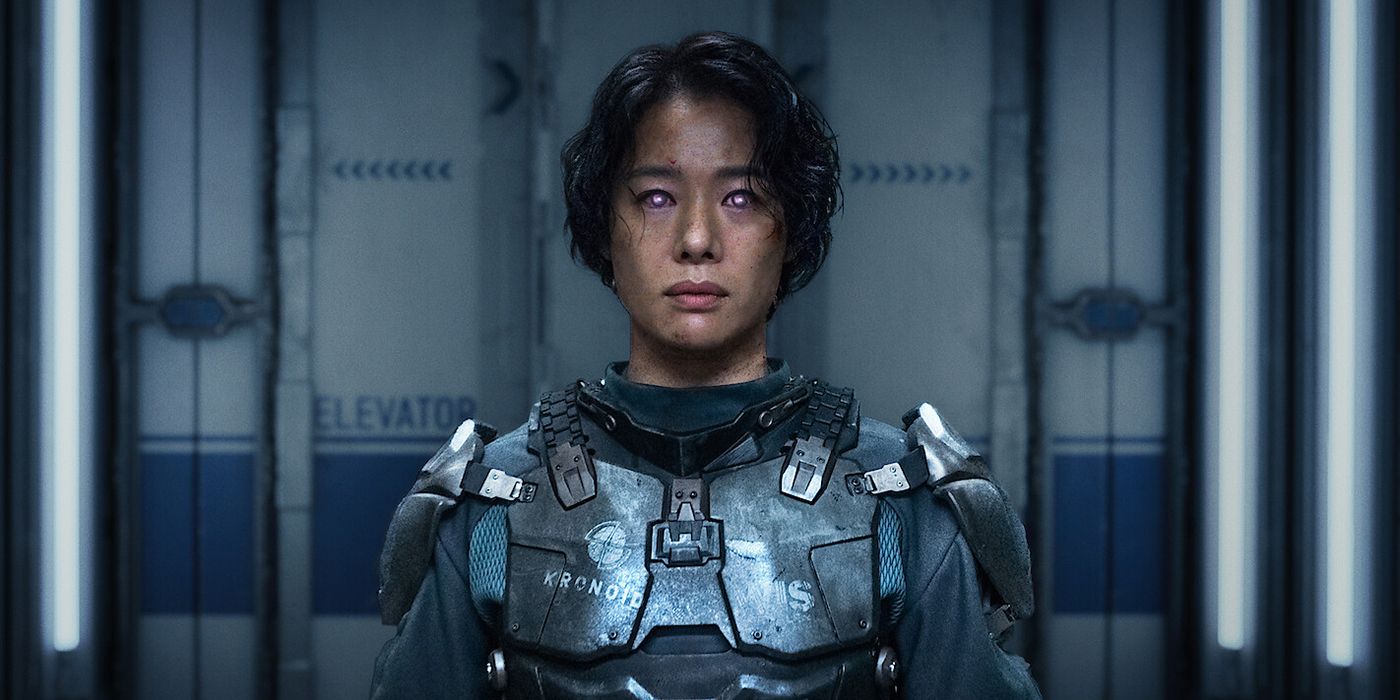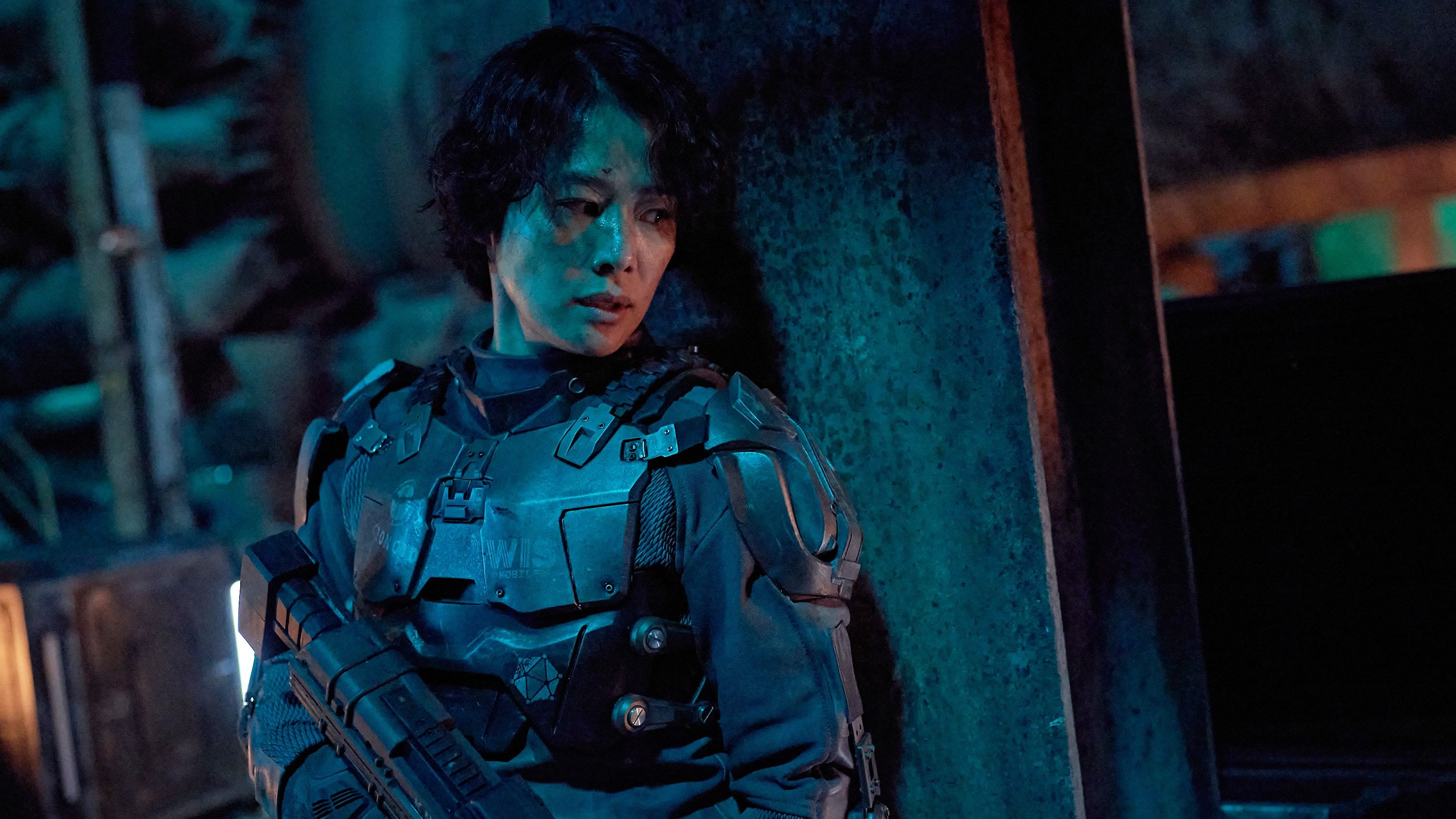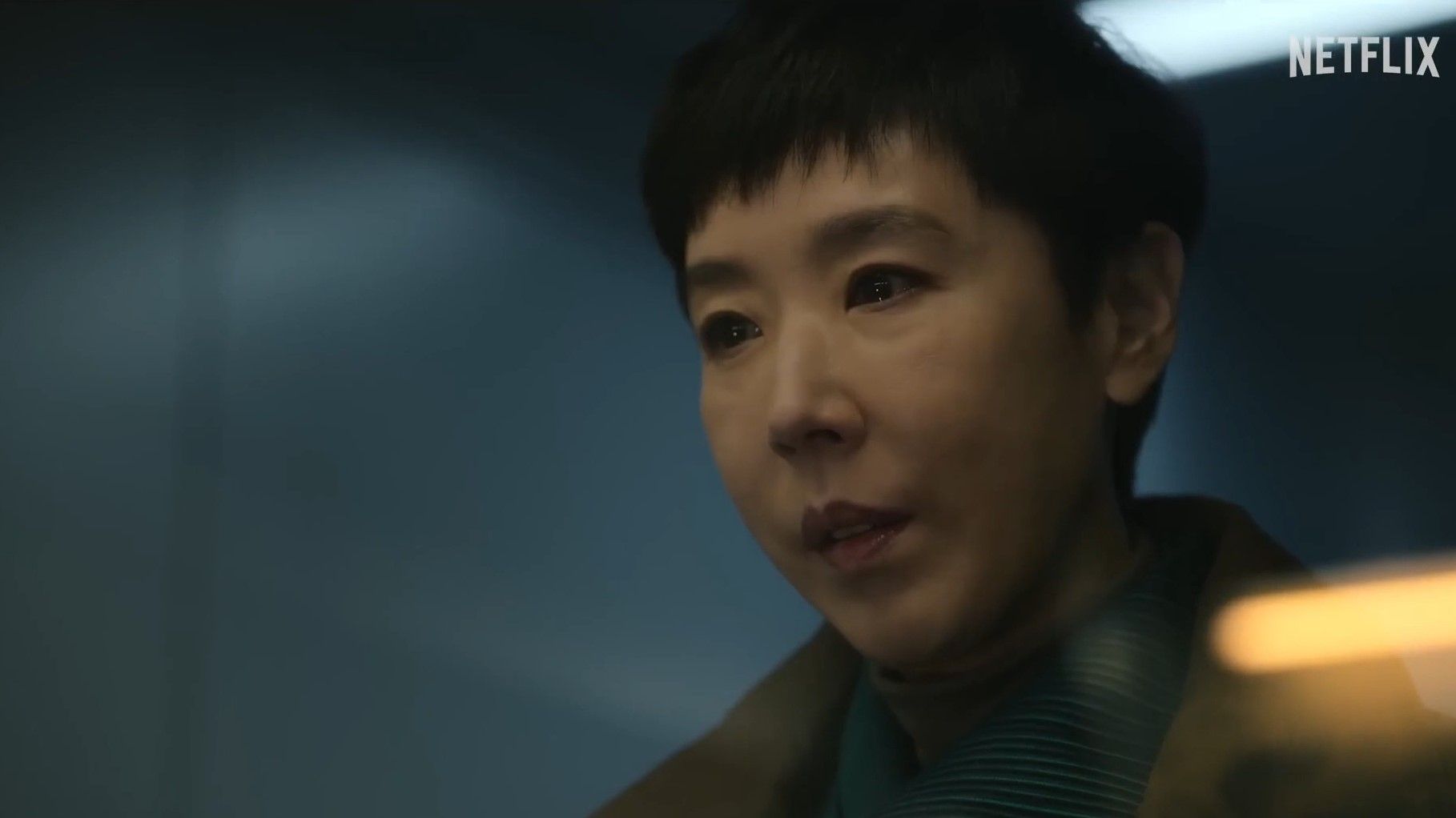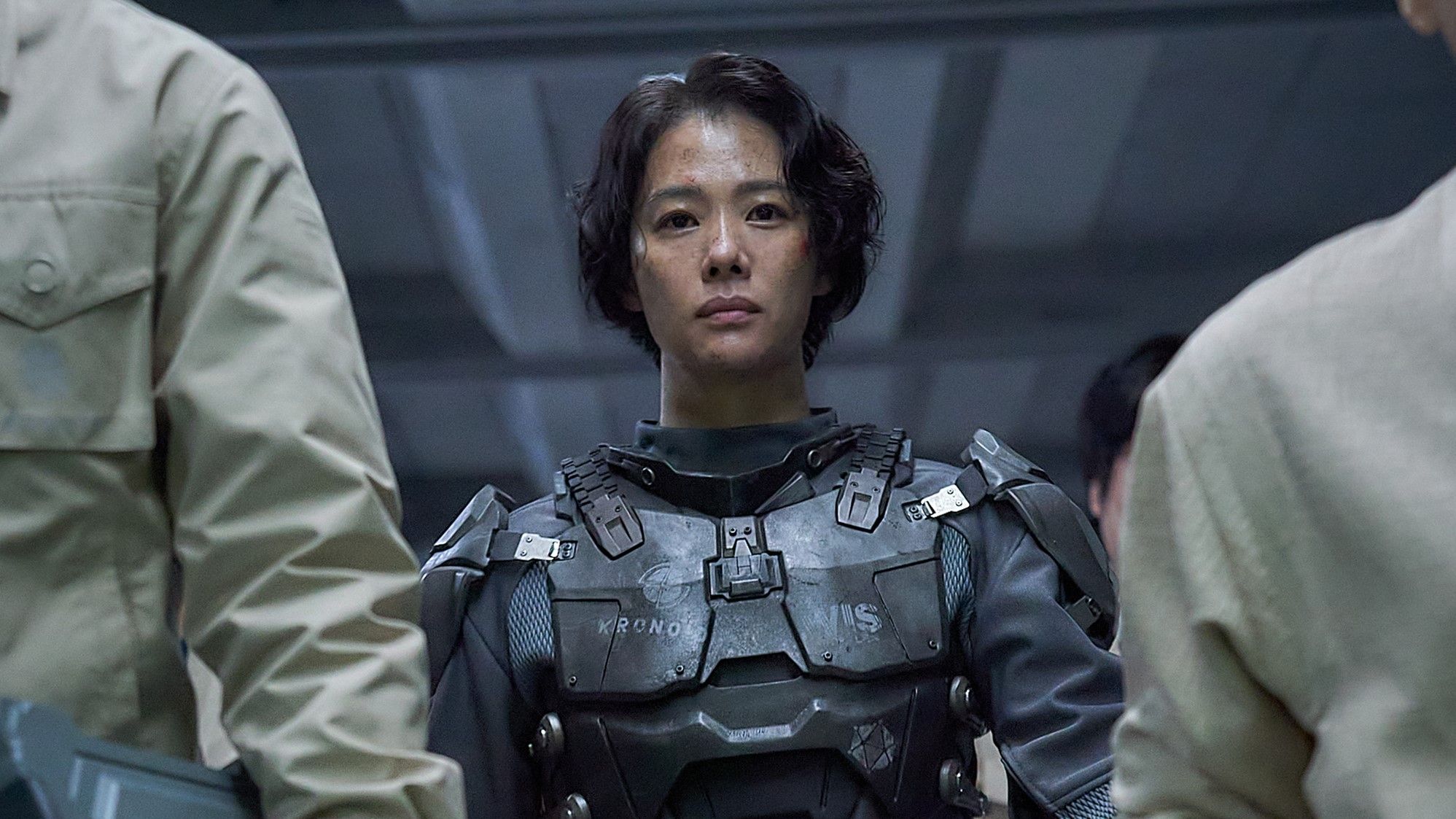JUNG_E, the ambitious new science-fiction film from Train to Busan director Yeon Sang-ho, dominated the Netflix Top 10 as soon as it debuted. Although it marks the visionary director's welcome return to a Neflix production following his K-Drama Hellbound (2021), Yeon isn't the creative who's involved in two concurrent projects on the streaming service — that's actress Kim Hyun-joo. Kim's character, the titular JUNG_E/Yun Jung-yi, isn’t the film's protagonist nor is Kim the first billed performer, but a JUNG_E without Kim's devastatingly nuanced performance as the protagonist’s mother would be a film lacking the second half of its soul. What can't help but delight (and tickle the funny bone in the best way) is the serendipitous fact Kim also leads the ongoing Netflix-distributed K-Drama Trolley with an equally arresting performance as a human mother in modern-day Korea who's not too dissimilar from JUNG_E's futuristic mercenary. A 45-year-old actress grounding two simultaneous projects? Yes, please. Both roles even serve as unintentional thematic mirrors.
What is 'JUNG_E' About?
With a premise too realistic for comfort — unaddressed climate change forces humanity into space; a handful of the 80 shelters floating among the stars splinter off to wage an ongoing war against the rest of mankind — JUNG_E opens in media res following an unnamed female soldier on a battlefield. Her instantaneously proven skill (those moves, damn) and disheveled grit (thank you for the realism) call to mind past action heroines like Ellen Ripley (Sigourney Weaver) in the Alien franchise. That, coupled with Kim Hyun-joo's ferocity, seems all the table-setting that's required for a sci-fi action rollercoaster.
Except this soldier catches a well-timed blast from one of her robotic assailants. Perhaps this was an accelerated Psycho shower moment? Maybe a fake death? It's definitely a narrative fake-out as the woman isn't dead, but wasn't "technically" even alive. This was a simulation inside the mind of an AI wearing a replica of the woman's face, and the figure's now surrounded by engineers taking notes, making firmware adjustments, separating parts, and shutting the AI offline.
'JUNG_E's Real Battleground Is Identity and Empathy
JUNG_E's true battleground is one of identity, empathy, and the respective erasure and lack thereof. The copycat android began life as Captain Yun Jung-yi, a human mercenary responsible for the Allied Forces's greatest wins against the splinter factions. Captain Yun's passion, briefly glimpsed in the AI simulation, wasn't born from a persevering love for Earth. Her young daughter Yun Seo-hyun (Park So-yi) has lung cancer. A ludicrously expensive surgery will remove the tumor, and in a 22nd century when humanity remains at war with one another, army mercenary work is the best way for a single mother to afford the operation.
Seo-hyun's surgery proves successful while Jung-yi's intended final mission goes awry, leaving her in a coma. On Earth, the only other member of Jung-yi's family — destroyed by her grief and unable to provide for Seo-hyun's future because of her own poverty — allows an experimental AI company to use Jung-yi's memories and image in the development of a battle android capable of assuming Jung-yi's place in the war effort.
More than three decades later, Seo-hyun oversees the JUNG_E project. Just as Seo-hyun's mother joined an intergalactic fight to protect her daughter's life, Seo-hyun aims to restore her mother's legacy as a hero via the JUNG_E project. Their passions are personal and the situations a means to an end. Spurred by several mitigating factors — the terminal return of Seo-hyun's cancer, a peace treaty rendering the JUNG_E project null and void, and an employee using one of the models as a sex toy — Seo-hyun chooses to help a fully aware JUNG_E escape the facility.
Kim Hyun-joo's Performance Gives 'JUNG_E' the Grounded Feel It Needs
It's in line with Yeon Sang-ho's style for JUNG_E to be a deeply psychological meditation on grief, motherhood as personhood, and love packaged inside the aesthetic of a genre piece. And Kim Hyun-joo's performance doesn't miss every bit of nuance she can wring from the already layered material. The dehumanization of both war and cancer show in the pained tears Jung-yi holds back when Seo-hyun offers her a good luck charm; a frightened child shouldn't also have to fear for her parent. Her love burns even stronger than pain, seen in Jung-yi gently stroking Seo-hyun's hair or the actress's quietly reassuring line delivery. When Seo-hyun restores Jung-yi's consciousness to full awareness within a JUNG_E model that's been severed from the waist down, wires dangling free, Kim's disoriented, terrified screams are almost too agonizing to hear. And yet, her subsequent weakened weariness when she asks if they found Seo-hyun's charm on the battlefield — she promised not to lose it — is more shattering. Despite a handful of scenes, Kim's acute honesty leaves an indelible impression and grounds JUNG_E's emotional core while heightening the film's overall impact.
If Jung-yi fights in a space war to save her daughter's life, Trolley’s Kim Hye-joo’s battlefield is emotional after spending decades hiding from a life-altering event. The series raises awareness regarding some of Korea’s more taboo subjects through the lead character, a politician’s wife (Hye-joo), as secrets about her past unravel alongside current revelations about the family she adores. Between her dedicated work running a book repair shop, consistently and cheerfully tending to her husband's and daughter's needs, and refusal to enter the limelight of her husband's career, it's obvious that Hye-joo is a kind soul, if reserved. A more complicated dynamic's at play with her older adopted son, whose indiscretions brought the shadow of controversy onto his father. She loves him, yet is forced to question whether she cares for her biological daughter more. The subtle and quickly-shifting lines of Kim's face — her gut reaction, her backpedaling, and her torturous guilt — say more than a brief, morally black-and-white sentence.
Kim's Mirroring Roles Feel Real, Not Exaggerated
When called to perform a frequent high level of emotion, however, Kim never rings false or exaggerated. Hye-joo's unswerving need for privacy stems from her trauma following a high school sexual assault. After reporting it to the police, the assailant, her best friend's brother, took his own life. The family and town blamed and vilified her, believing the reputation of a promising boy just accepted into college instead of an orphaned girl. As such, it's implied Hye-joo has never processed the experience, burying it alongside her old name. The safety and trust she feels with her husband and daughter never waver through thought, expression, or deed, but even before the assailant's sister invades her life bent upon revenge, tragic local events trigger Hye-joo's memories. Her hands tremble around a plastic bag and her eyes skitter from corner to corner, scrambling for an escape path; she laughs off her husband's advances or automatically raises her voice when a stranger enters her bedroom without permission. Later, when re-traumatizing incidents strike tragically closer to home, her sobs double her over or drive her to the ground. Hye-joo's formerly relaxed body language stays constantly hunched, her gaze avoidant; her fingers pick her skin and her once calm voice sounds strained.
No matter the differences between JUNG_E and Trolley, Kim's performance grounds each role in equal believability without their undeniable similarities overlapping. Each is mesmerizing, refined, and distinctive, highlighting different facets of the veteran actress's talent. Both Jung-yi and Hye-joo are caught in unjustifiable circumstances by the powerful forces beyond their control, and both represent incredibly complex themes such as motherhood as personhood, grief, and humiliation. Both are survivors, deservingly sympathetic and remarkably rendered.




